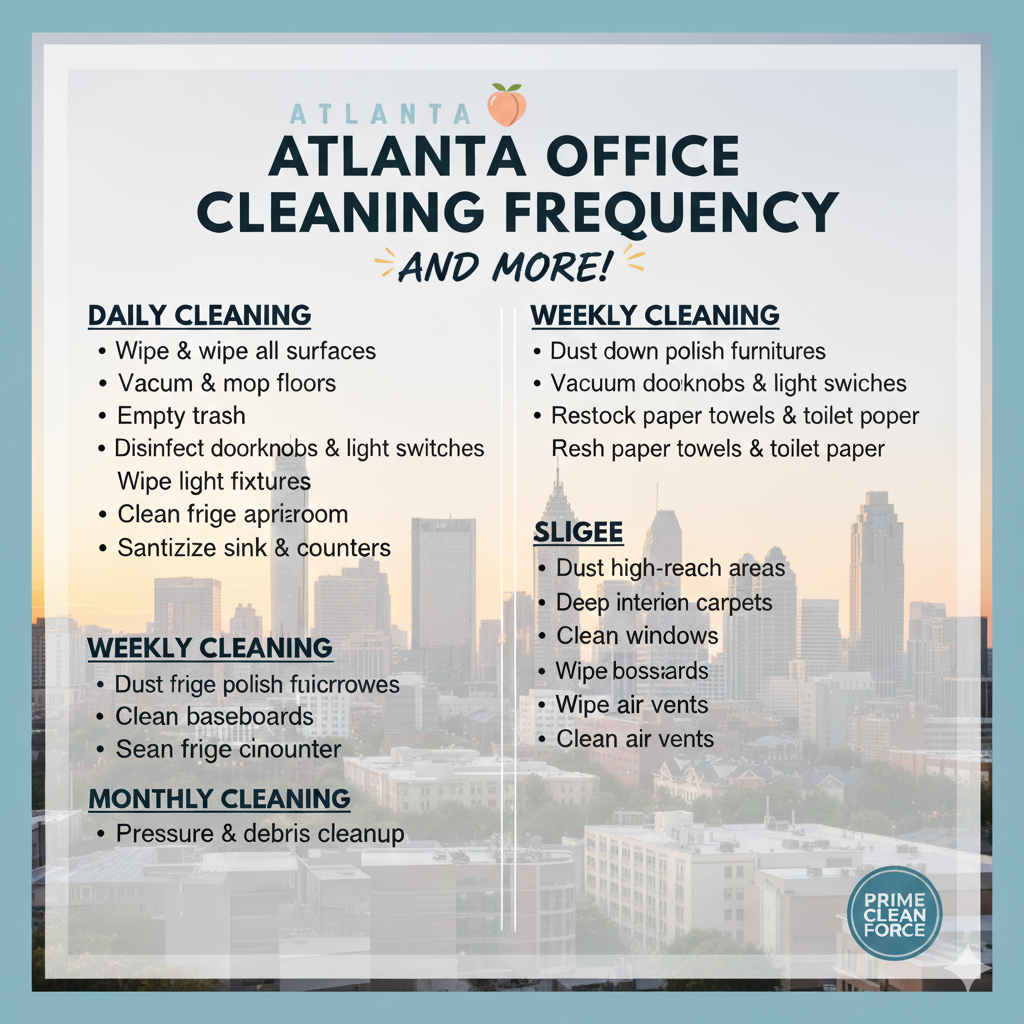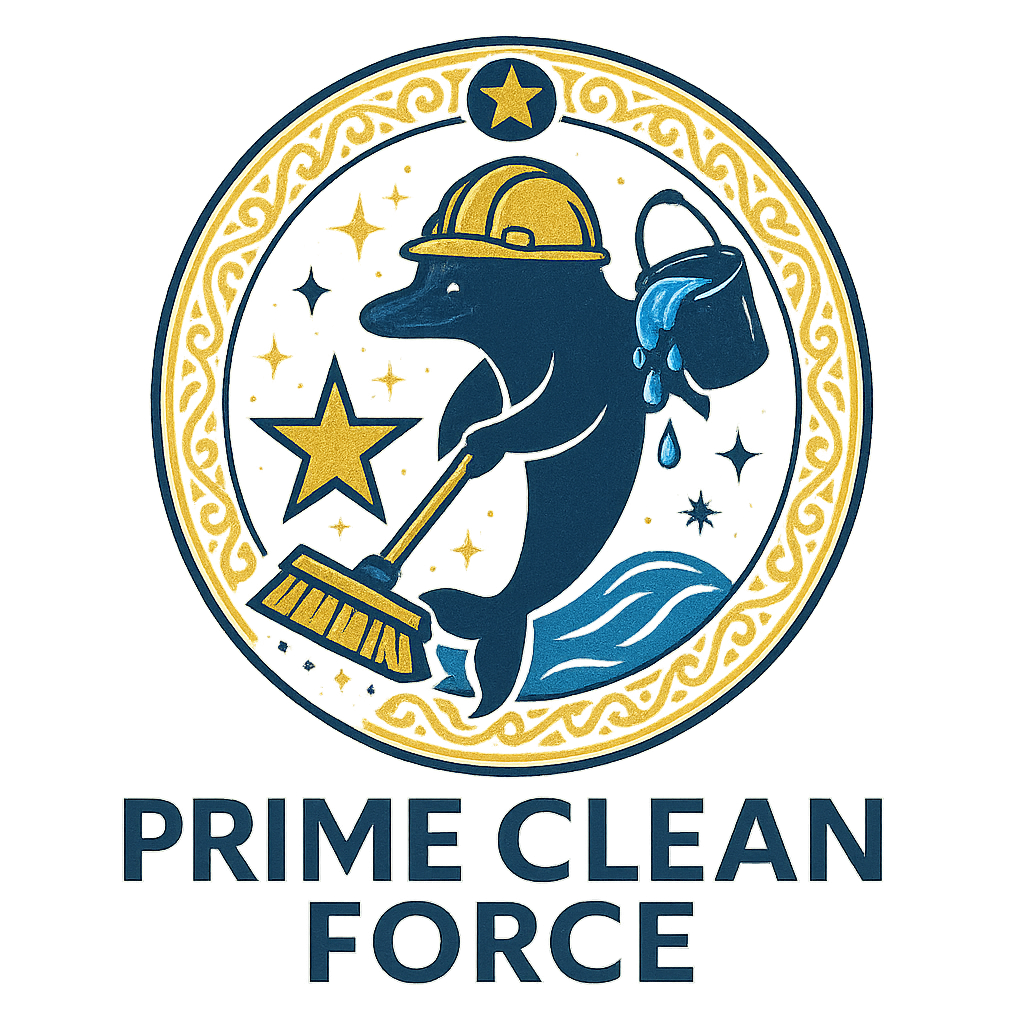For any Atlanta business, maintaining a clean and healthy office environment is a critical investment. It directly impacts employee productivity, reduces sick days, and shapes the first impression you make on clients and partners. However, determining the optimal frequency for professional cleaning isn't a one-size-fits-all answer. A low-traffic tech startup in Midtown has vastly different needs than a bustling medical clinic in Sandy Springs or a high-end retail store in Buckhead.
The right schedule depends on a careful assessment of your space, foot traffic, and specific industry standards. This guide provides a fact-based framework to help Atlanta facility managers and business owners create a cleaning schedule that keeps their workspace pristine, healthy, and professional.

Key Factors That Determine Cleaning Frequency
Before creating a schedule, analyze these four critical factors:
- Foot Traffic: This is the most significant factor. An office with 50 employees and daily client visits will require more frequent cleaning than a 10-person office with no public access.
- Type of Business: Medical facilities, restaurants, and fitness centers have stringent health and sanitation requirements that demand daily, specialized cleaning. Corporate offices have more flexibility.
- Office Layout and Size: A larger office with more common areas like kitchens, multiple restrooms, and conference rooms will naturally require more attention.
- Health and Wellness Standards: In a post-pandemic world, maintaining high standards of hygiene is paramount. This includes a focus on disinfecting high-touch surfaces and ensuring good indoor air quality.
Recommended Cleaning Frequency by Space Type
The best approach is to create a customized plan based on how different areas of your office are used. High-traffic, shared spaces need daily attention, while private offices can often be serviced less frequently.
| Area / Task | High-Traffic Facility | Low-Traffic Facility |
|---|---|---|
| Restrooms & Washrooms Cleaning, sanitizing, restocking |
Daily (or multiple times per day) | Daily to 3x per week |
| Break Rooms & Kitchens Wiping surfaces, sink, floors |
Daily | Daily to 3x per week |
| Reception & Lobbies Floors, dusting, glass |
Daily | 2-3x per week |
| Common Areas & Hallways Vacuuming, mopping |
Daily | 1-3x per week |
| General Workstations & Offices Emptying trash, light dusting |
Daily | 1-2x per week |
| Disinfecting High-Touch Surfaces Doorknobs, light switches, elevator buttons |
Daily | Daily |
| Deep Carpet Cleaning Hot water extraction |
Quarterly to Semi-Annually | Annually |
| Window Cleaning Interior and exterior |
Quarterly | Semi-Annually |
Beyond the Surface: Air Quality and Disinfection
A truly clean office goes beyond what you can see. Indoor air quality and proper disinfection are crucial for employee health.
Ventilation and Filtration
Good ventilation is your first line of defense against airborne pathogens. In addition to regular cleaning, it's important to maintain your HVAC system. The American Society of Heating, Refrigerating and Air-Conditioning Engineers (ASHRAE) provides guidance on this.
ASHRAE recommends that commercial buildings aim for air filters with a MERV-13 rating or higher where feasible. MERV (Minimum Efficiency Reporting Value) indicates how effectively a filter captures airborne particles. Upgrading to MERV-13 can significantly improve the removal of viruses, bacteria, and allergens from the air.
Effective Disinfection: A Mini-FAQ
Simply wiping a surface with a disinfectant isn't always enough. Proper technique is essential for actually killing germs.
What are "high-touch" surfaces? These are areas that multiple people touch frequently throughout the day: doorknobs, light switches, elevator buttons, handrails, reception counters, and shared equipment like printers and coffee makers.
What is "contact time" or "dwell time"? This is the amount of time a disinfectant must remain wet on a surface to effectively kill germs. This can range from 30 seconds to 10 minutes depending on the product. A professional cleaning service is trained to follow these manufacturer-specified dwell times to ensure true disinfection.
Building Your Custom Cleaning Plan
Every Atlanta business is unique. Use the frequency table above as a starting point, then adjust based on your specific needs. Walk through your office and identify the high-traffic zones and problem areas. Consider a schedule that includes:
- Daily Tasks: Core services for high-traffic and hygiene-critical areas (restrooms, kitchens, lobbies).
- Weekly Tasks: More detailed cleaning for lower-traffic areas (individual offices, conference rooms).
- Monthly/Quarterly Tasks: Periodic deep cleaning tasks like window washing, carpet cleaning, and high dusting.
By creating a structured, proactive cleaning plan, you not only ensure a pristine workspace but also demonstrate a clear commitment to the health and well-being of your employees and clients.
Need a Custom Cleaning Plan for Your Atlanta Office?
Take the guesswork out of your facility maintenance. Prime Clean Force works with Atlanta businesses to develop customized janitorial plans that fit your traffic, budget, and industry requirements. Contact us today for a free on-site consultation and quote.
